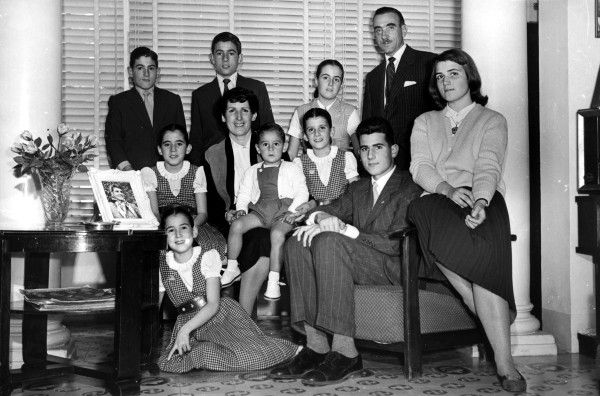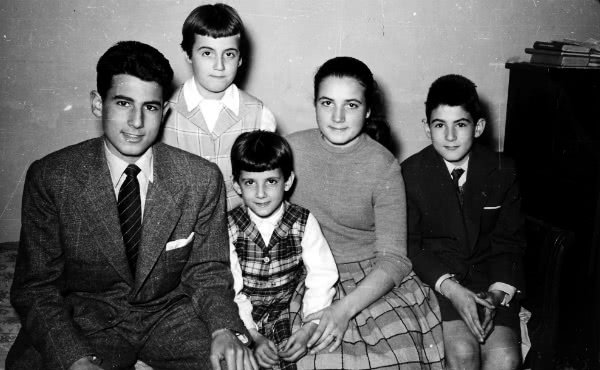CONGREGATION OF THE CAUSES OF SAINTS
BARCELONA
BEATIFICATION AND CANONISATION
OF THE SERVANT OF GOD
MARIA MONTSERRAT GRASES GARCIA
LAYWOMAN
OF THE PERSONAL PRELATURE OF THE HOLY CROSS AND OPUS DEI
(1941-1959)
_____
DECREE OF VIRTUES
“I am a daughter of God”, “Whenever You want, as You want, and in whatever way You want”, “Omnia in bonum”.
These three aspirations, which Maria Montserrat Grases often repeated, describe her spiritual journey most fittingly. Her very keen awareness of her divine filiation prompted her to fulfil God the Father’s will lovingly, with the assurance that all that He sends us is always for the best. Maria Monserrat Grases Garcia, known to everyone as Montse, was born in Barcelona, Spain, on the 10th July, 1941 and was baptized nine days later. She was the second of the nine children of Manuel Grases and Manolita Garcia.
The childhood and teenage years of the Servant of God were spent in the peaceful atmosphere of a Christian family. Montse’s parents were both faithful of Opus Dei, who tried to create a bright and cheerful home atmosphere, according to the teachings of St Josemaria Escriva.
After completing her secondary education, which she combined with learning to play the piano, Montse joined a professional school. She liked sports, hiking, music, folk dancing and performing in plays. She had many friends, boys and girls.
Her parents taught her to deal with Jesus with a lot of confidence, and helped her bring out the best points of her character: cheerfulness, simplicity, forgetfulness of self, and concern for the spiritual and material good of other people. During her teens, together with some of her study companions, she would visit poor families in Barcelona, and give catechism to the children and sometimes take them toys and sweets. She had a lively, impulsive temperament, and at times her reactions could be a little brusque, although her relatives and teachers recall that she used to struggle to control her feelings and be friendly and jovial with everyone.
In 1954, her mother suggested to her to attend a centre of Opus Dei that offered Christian and human formation to young girls. Step by step she realized that God was calling her to the Work and on 24th December, 1957, after meditating, praying and asking her parents’ advice, she asked to join Opus Dei, with total dedication in apostolic celibacy.
From then on, she strove with greater determination and constancy to seek sanctity in her daily life.
She started on an intense daily plan of spiritual life, which included attending Mass, the Holy Rosary, reading of the New Testament and spiritual books, and other practices of piety. In addition, she lived a real spirit of penance, including generous corporal mortifications, offering Our Lord many small sacrifices throughout the day, and struggled to improve her defects of character.

Likewise, she was constant in her zeal to bring her friends and companions closer to God, taking advantage of their daily living and working together. For example, when playing sports, she would be at the service of the others and transmit to them the peace she experienced from living close to God.
In December, 1957, on a mountain excursion, she fell and hurt her knee badly. It didn’t seem serious at the time, but after some days the pain only got worse. After consulting several doctors, in June 1958 they diagnosed an Ewing sarcoma in the femur of the left leg. When her parents told her that her illness was incurable and terminal, Montse took it with immense peace and supernatural outlook, while continuing to seek to please God in her daily life.
Her illness caused her intense and ever-increasing pain. The Servant of God offered her sufferings for the Church, for the Pope, for Opus Dei and for the many specific intentions her relatives and friends asked her to pray for. She thought of her neighbor more than herself, and never complained. On the contrary, her cheerfulness was always infectious. She brought many of those who came to visit her nearer to God. Those who lived with Montse bore witness to how she grew closer to God and how she transformed her suffering into prayer and apostolate: into true sanctity.
From when she asked for admission to Opus Dei, the Servant of God had undertaken a serious quest for sanctity in the middle of the world, so that her illness found her well prepared to live the virtues with complete heroism.
She died peacefully on Holy Thursday, 26th March, 1959, and was buried two days later. In 1994, her mortal remains were transferred to the crypt of Santa Maria de Bonaigua, where they now lay.
From the first moment, testimonies of her reputation of holiness –now spread to many countries- and news of graces and favours obtained through her intercession were abundant.
Montse died in the fullness of youth, just before her 18th birthday. Though short, her life was a real gift of God for those who knew her then, and who have come to know her afterwards, because she performed her daily tasks with great love for God and other people. She brought many souls to Jesus with her piety, her smile and her simple, heroic generosity. Her early correspondence to God’s love is an example that will help many people, especially the young, to understand the beauty of following Christ in their daily lives.
The investigative proceedings into the reputation of holiness, the virtues in general and the miracles took place in Barcelona from 1962 to 1968. When new legislation on causes of canonization was promulgated, the Archbishop of Barcelona, after appointing a commission of historical experts to gather relevant documents, asked for additional proceedings, which took place in 1993.
The special Congress of theological consultants, which took place on 30th June, 2015, agreed that the Servant of God had practiced the virtues to a heroic degree. The Ordinary Session of the members of the causes of the Saints, presided by the undersigned, Cardinal Angelo Amato, gave their full assent.
A detailed account was presented to the Supreme Pontiff, Francis, setting out all the stages explained above. The Holy Father, receiving and ratifying the opinion of the Congregation of the Causes of the Saints, with today’s date, has declared solemnly:
From the foregoing, there is sure evidence of the theological virtues of Faith, Hope and Charity, both with God and neighbor, and the cardinal virtues of Prudence, Justice, Temperance and Fortitude and their dependent virtues, all of which were lived to a heroic degree, and the reputation of holiness of the Servant of God Maria Montserrat (Montse) Grases Garcia, laywoman of the Prelature of the Holy Cross and Opus Dei.
The Holy Father has decided that this Decree should be published and transcribed in the Acta (records) of the Congregation of the Causes of the Saints.
Given at Rome, the 26th day of the month of April in the year of Our Lord, 2016.
ANGELO Card. AMATO, S.D.B.
Prefect
Titular Archbishop of Bevagna
Secretary
